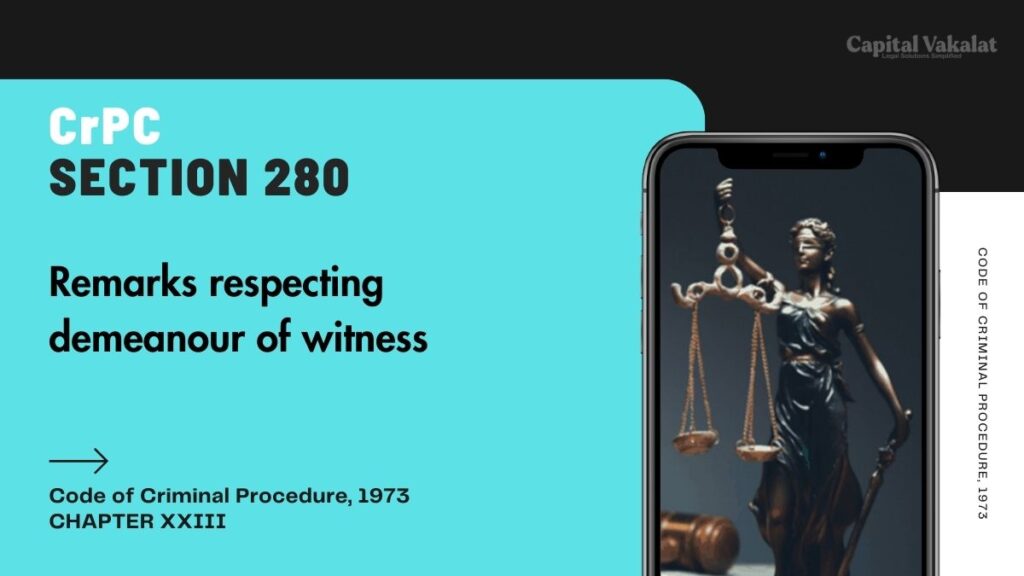The courtroom is a stage where the drama of law unfolds, and every player, from the judge to the witnesses, has a critical role to play. One aspect of this theatrical performance is the demeanor of witnesses, an element so vital that it has been given due recognition under Section 280 of the Criminal Procedure Code (CRPC).

In legal parlance, demeanor refers to the outward behavior, body language, and overall conduct of a witness while testifying. The judge’s observations about these aspects can significantly influence the outcome of a trial.
Bare Act. Section 280 Cr.P.C.
Remarks respecting demeanour of witness.
When a presiding Judge or Magistrate has recorded the evidence of a witness, he shall also record such remarks (if any) as he thinks material respecting the demeanour of such witness whilst under examination.
Section 280 CRPC: A Crucial Provision
The Criminal Procedure Code (CRPC), enacted in 1973, is the principal legislation on procedure for administration of substantive criminal law in India. Section 280 specifically deals with the judge’s ability to record remarks regarding the demeanor of witnesses. These observations can include anything from a witness’s nervousness to their eye contact, or lack thereof, during testimony.
Historical Context and Evolution
Section 280 of the CRPC has its roots in earlier legal frameworks, including the British legal system, which emphasized the importance of a witness’s demeanor. Historically, judges have relied on such observations to gauge the credibility of witnesses. This section has evolved to provide a structured approach to recording these critical observations.
Importance of Witness Demeanor
Witness demeanor plays a crucial role in trials for several reasons. First, it aids the judge in assessing the reliability and credibility of the witness. A calm, confident witness may be perceived as truthful, while a nervous or evasive one might raise suspicions. Second, it helps in understanding the witness’s emotional state and potential biases. Lastly, it ensures a fair trial by allowing the judge to make informed decisions based on comprehensive observations.
How Judges Record Demeanor Remarks
Under Section 280, the judge has the discretion to note their observations about a witness’s demeanor directly in the record of the proceedings. These remarks are then available for consideration during the trial and any subsequent appeals. This practice ensures transparency and provides a detailed account of the witness’s conduct, which can be pivotal in the judicial decision-making process.
Impact on Judicial Decisions
The remarks on a witness’s demeanor can have a profound impact on judicial decisions. For instance, if a judge notes that a witness appeared overly anxious or hesitant, it might cast doubt on their testimony’s reliability. Conversely, a composed and articulate witness may lend greater weight to their statements. These observations can sway the judge’s or jury’s perception and ultimately influence the verdict.
Challenges and Controversies
While Section 280 CRPC aims to provide an objective assessment of a witness’s demeanor, it is not without its challenges and controversies. Critics argue that demeanor can be subjective and influenced by cultural differences, personal biases, and the witness’s individual characteristics, such as nervousness under pressure. Moreover, there’s the risk that judges might misinterpret or overemphasize certain behaviors, leading to potential miscarriages of justice.
Best Practices for Judges
To mitigate these challenges, judges are encouraged to follow best practices when recording demeanor remarks. These include:
- Objectivity: Focusing on specific behaviors rather than making generalized statements.
- Contextual Understanding: Considering the context and circumstances that might affect the witness’s behavior.
- Training: Participating in continuous training to improve their ability to accurately assess and record witness demeanor.
Case Studies Illustrating Section 280 CRPC in Action
Several notable cases highlight the application of Section 280 CRPC. In many trials, judges have meticulously recorded demeanor remarks, which have later played a crucial role in appeals and higher court judgments. These cases underscore the importance of this provision in ensuring justice is served.
Comparative Analysis with Other Jurisdictions
A comparative analysis reveals that many other legal systems, including those in the United States and the United Kingdom, also recognize the importance of witness demeanor. However, the methods and extent to which these observations are recorded and utilized vary. Understanding these differences can provide valuable insights into improving the application of Section 280 CRPC.
Role of Lawyers in Addressing Demeanor Remarks
Lawyers play a vital role in addressing demeanor remarks during trials. They can challenge or support these observations through cross-examination and by presenting evidence that contextualizes the witness’s behavior. Effective legal strategies can mitigate potential negative impacts of demeanor remarks on their client’s case.
Technological Advancements and Future Implications
Technological advancements, such as video recordings of testimonies, offer new ways to capture and analyze witness demeanor. These tools can complement the judge’s observations, providing a more comprehensive view of the witness’s conduct. As technology evolves, it will be interesting to see how it influences the application of Section 280 CRPC.
Ensuring Fairness and Justice
Ultimately, the goal of Section 280 CRPC is to ensure fairness and justice in the judicial process. By providing a structured approach to recording and considering witness demeanor, this provision helps judges make more informed decisions. However, continuous efforts are needed to address its challenges and enhance its effectiveness.
Conclusion
Section 280 CRPC is a critical component of the Indian judicial system, providing a framework for judges to record and consider the demeanor of witnesses. While it has its challenges, the provision plays a vital role in ensuring fair and informed judicial decisions. By understanding its importance and addressing its limitations, the legal community can continue to uphold the principles of justice and integrity in court proceedings.